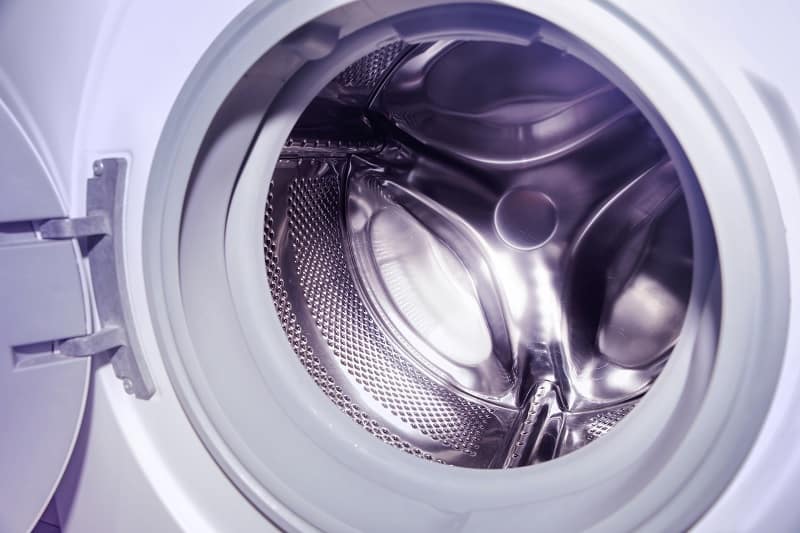The reason we all use a washing machine is that we want our laundry to be clean and smell fresh… so what happens if your washing machine smells like rotten eggs?!
There are many reasons why a washing machine could be kicking out a stink, so we’re going to go through some of these right here!
Don’t worry, most washing machine owners have experienced a diverse range of pongs coming from their appliance, so there’s definitely a diagnosis and a treatment for all smells, great and small!
Don’t worry, most washing machine owners have experienced a diverse range of pongs coming from their appliance, so there’s definitely a diagnosis and a treatment for all smells, great and small!
Problem 1: “My washing machine smells damp”
That subtle, musty smell of damp is probably from a build-up of mildew and mould.
As we discussed in our post about how to clean mould from the washing machine drawer, black mould and soap scum can build up in certain areas of your machine – the detergent drawer being a key contributor to foisty, damp smells.
Potential cause 1: Dirty soap dispenser
Give the soap dispenser drawer a deep clean at least once a month and if you find smells persist use bicarbonate of soda and white vinegar:
- Remove the drawer and clean if needed
- Put a tablespoon of bicarbonate of soda into the drawer housing area
- Spray the bicarb with white vinegar to cause the powder to froth up
- This chemical reaction between these two natural cleaning products will deodourise the drawer pipe and lift away extra grime that can’t be reached
Potential cause 2: Dirty washing machine door seal
Another area to check is around the rubber door seal – this traps a multitude of things, moisture, hair and possibly even bits of those accidentally-washed tissues!
Mould can also grow here, so it is super important to clean this regularly – about once a week is ideal, just using a damp cloth.
Use bathroom cleaner and a soft, spongey cloth to get right into the fold of the rubber if you haven’t been keeping on top of your washing machine cleaning.
Potential cause 3: Mildew and debris in the washing machine filter
Also, check the washing machine filter. Many people don’t realise that you can access this at the bottom of your machine – it is usually a knob found behind a door which can be unscrewed and water let out:
- Open the door or remove the panel on the front, base of the machine
- Lay down a tea towel on the floor in front of your washing machine and pop your rubber gloves on
- Place a baking tray or some form of a flat container with raised sides underneath the filter access (on top of the tea towel)
- Unscrew the knob and you will find that water will come out of the machine and there may even be hair, fluff or other bits of residue in there too
NOTE: Some washing machines have a hose which can be used to drain the water from the machine
- Pull out any visible blockages and then spray bathroom cleaner or mould and mildew cleaner into the filter space before scrubbing inside with a small brush (a toothbrush will do)
- Place the filter cap (knob) into the sink, spray with mould and mildew spray and leave for a little while
- Rinse the filter space with warm water and rinse the cap before replacing
- Tip away the water from your tray and bin any fluff or gunk
Problem 2: “My washing machine still smells after cleaning”
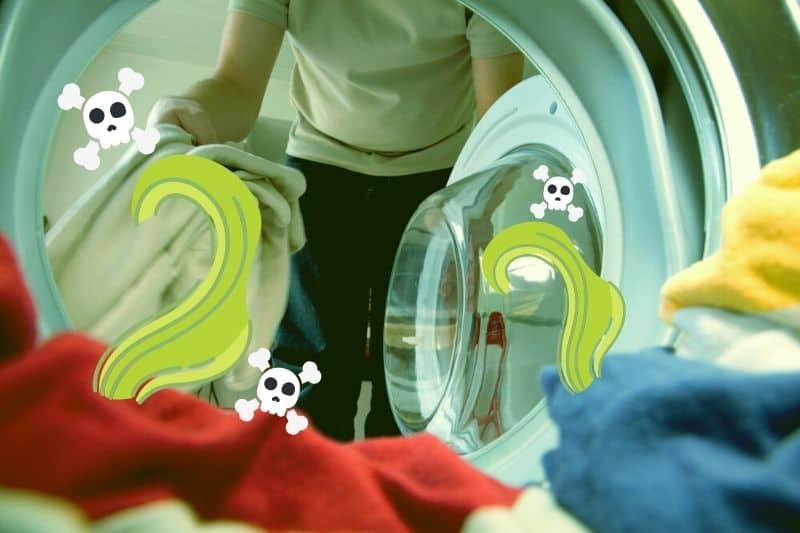
After cleaning your washing machine, you might find that the damp smell dissipates, but if not, you may have to run a hot wash cycle.
Potential cause: Using too much detergent
Using too much detergent or fabric softener during a wash means that excess can build up and cause musty smells.
Use the guidance lines on your machine to make sure you’re not clogging up the drawer with soap scum. If unsure, check your machine’s user guide or instruction manual.
Potential solution: Run an odour-neutralising hot cycle
To give some added odour-neutralising power, you could run a hot wash cycle with soda crystals, bicarbonate of soda, white vinegar or a mix.
- Soda crystals – Add 500 g of soda crystals to the drum and run your machine on the hottest, longest setting. This will not only remove smells but can also help to remove any staining in the drum.
- White vinegar – Use 250 ml of white vinegar poured directly into the drum and run your machine on a long hot wash. Vinegar is known to kill more than 80% of mould varieties and is a great all-round natural cleaner.
- Soda crystals and white vinegar – Use 500g of soda crystals (as described before) and add 250 ml of white vinegar to the drum. These two ingredients work together to breakdown limescale build-up as well as deodourise. This method is ideal for areas known to have hard water.
- Bicarbonate of soda and white vinegar – Mix 3 teaspoons of bicarbonate of soda (also known as baking soda) with a couple of teaspoons of water to form a paste. Place this paste into the detergent drawer and then add 250 ml of vinegar to the drum (as before). A 60°C wash should do the trick to leave you with a squeaky clean and odour-free washing machine.
Problem 3: “My washing machine smells like egg”
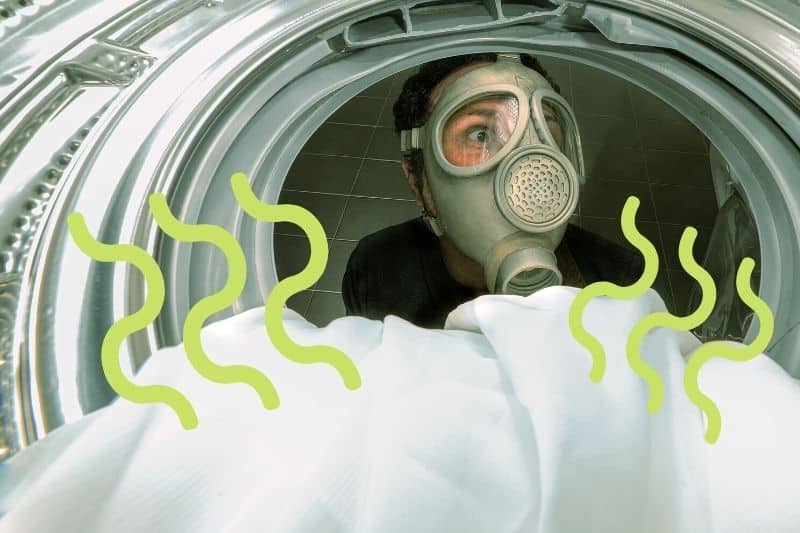
This problem is more common than you might think and it has to do with the washing machine’s drain.
The waste pipe that comes from the back of your washing machine goes into a drain pipe which is supposed to take the wastewater away to the sewers.
This can sometimes go wrong however and the culprit could be a number of things.
Potential cause 1: Old water in the trap
If you only do laundry once or twice a week, then the water in the waste pipe’s trap could become stagnant and cause that pongy egg smell.
The trap is there to block gases from the sewers from entering your home, so this can’t be removed, it just needs to be flushed through by running an empty hot wash cycle (you could add white vinegar to this wash to help remove limescale).
Potential cause 2: Washing machine set up incorrectly
Perhaps when the machine was set up, the drain hose was pushed too far into the standpipe and has entered into the trap, which defeats the object of the trap.
The water that formed the barrier between your washing machine and the sewage gases has been broken, therefore you might end up with a sulphurous smell in your machine or throughout your laundry room or kitchen.
Potential cause 3: Drain or pipe is blocked
There could be a blockage somewhere in the pipework. This could be in the washing machine hose itself, or in the standpipe or trap.
If you think the pipe is blocked, you could try to use a drain cleaner like these Green Gobbler Drain Opening Pacs in the pipe which should help to unclog it and flush away any nasty gunk.
Turn off your water supply before checking for blockages and if you’re unsure about how to check or unclog the pipes, call in the help of a professional plumber.
Potential cause 4: General grime and gunk build-up
Organic materials such as hair attract the growth of bacteria quite readily, so if you smell something rotten, it could well be a build-up of slimy hair in the machine’s door, filter or drain.
Clean all parts of your machine with the aforementioned methods to help rid your washing machine of horrible scents!
Problem 4: “My washing machine smells like oil”
Despite being much better for the environment, washing your laundry on the cooler settings does not remove grease and oil as effectively as a hotter wash would, so this can build up in your machine – around the rubber door seal and in your filter are the most likely to be affected by this.
Potential solution: Run a hot wash
Run an empty hot wash with white vinegar to help break down any residual oil in your machine. If this doesn’t work, or if your machine continues to smell like oil, then it could be something more sinister.
Potential cause: Washing machine is broken
An oily smell accompanied by signs that oil could be leaking from part of your machine is a sign that you need to call a plumber or it could be time for a new washing machine. These signs include:
- Oily smelling washing and oil spots on your clothes
- A generally oily smell in your machine and oil leaking from underneath
How to Keep Your Washing Machine Stink-Free
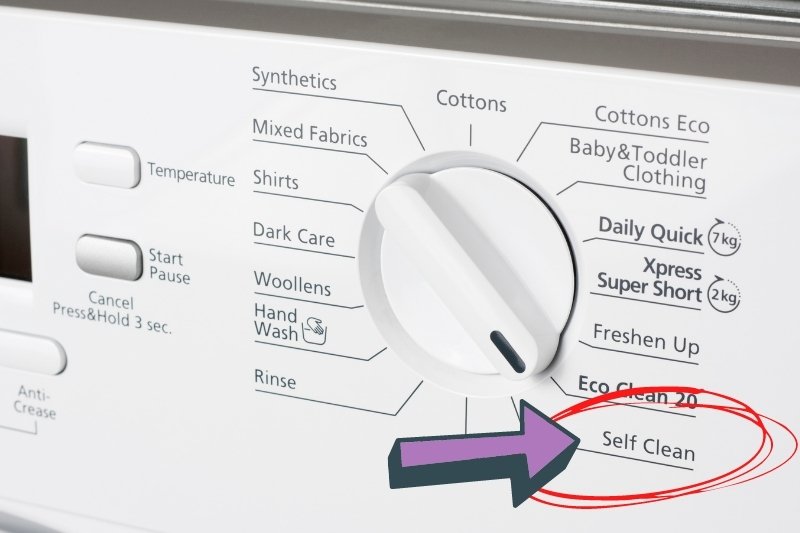
Once you’ve got your washing machine smelling fresh, you want to keep it that way. Here are some quick tips for keeping your machine stink free.
- Run a “service wash” monthly – To stop odours building up, it is recommended that you run a “service wash” every month. This is just a hot wash with an empty drum, which can help to keep your machine from becoming smelly from stagnant water or otherwise.
- Leave the door open when not in use – Always leave your washing machine door slightly open and the detergent drawer too, this will allow air to circulate and help to keep the drum and drawer drier – less prone to mould and mildew.
- Don’t leave damp washing in the machine – Don’t leave wash loads in the machine – take them out as soon as the cycle is completed! Leaving damp clothes inside your washing machine for an extended amount of time can lead to more bacteria build-up.
Once you have a clean as a whistle washing machine, here are a couple of products to make your laundry smell absolutely amazing!
- Lenor Unstoppables – Available in multiple scents, these little beads are added to your washing machine drum before popping in your laundry and they really do boost the scent of your wash load. Check your local supermarket for this yummy-smelling range of in-wash scent boosters.
- Ecoegg Laundry Egg – Ideal for those looking to reduce their carbon footprint is this laundry egg which lasts for up to 210 washes, makes your clothes smell fresh and replaces detergent entirely – economically and environmentally friendly.
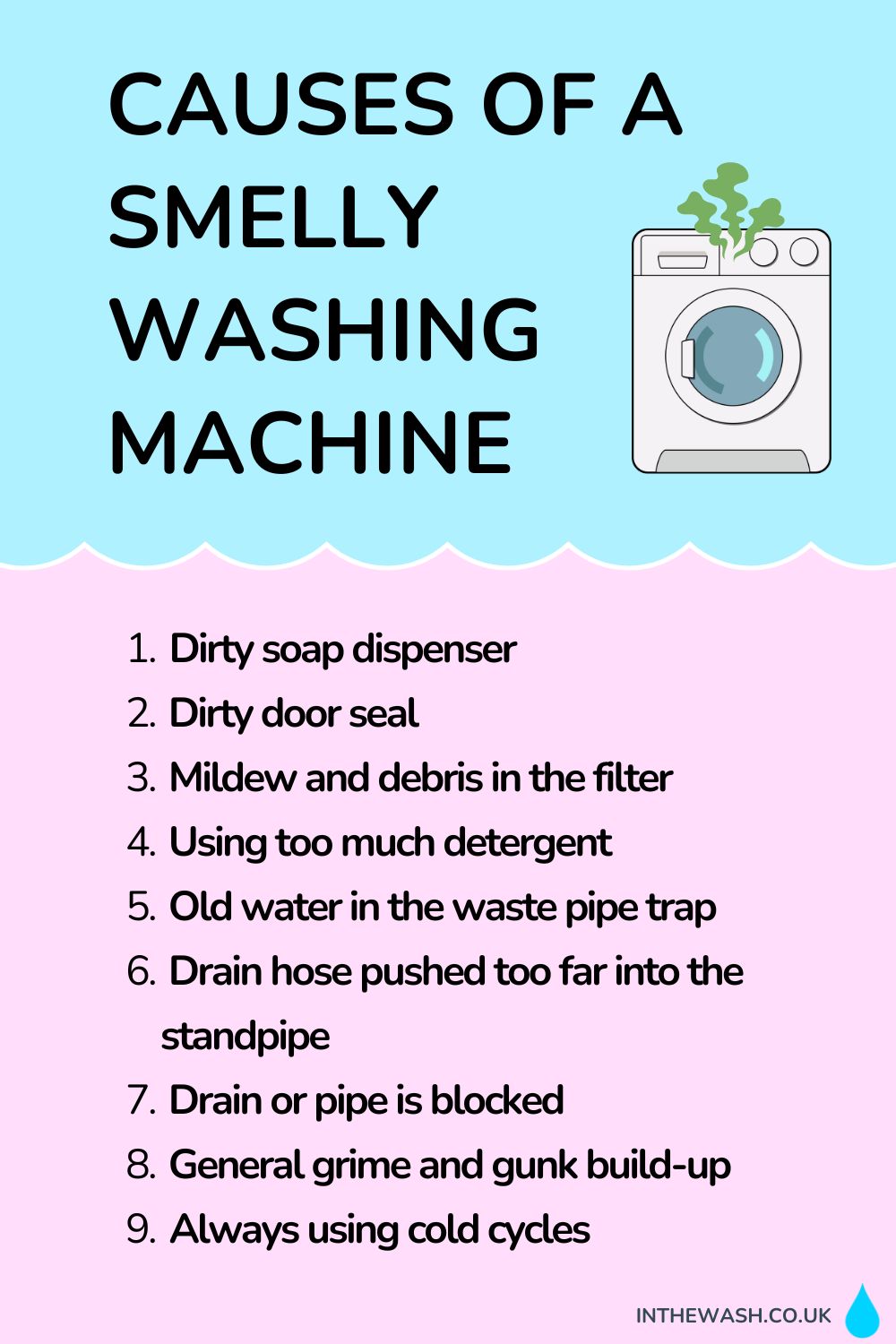

In The Wash is your guide to the best laundry and cleaning products, tips and tricks. Our mission is to solve the UK’s cleaning and laundry dilemmas!
